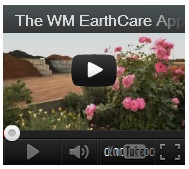The Altamont Landfill opened the first industrial Covered Aerated Static Pile (CASP) composting facility in Alameda County, providing in-county processing of up to 500 tons per day of residential green waste co-collected with food waste.
Composting

CASP Facts
Over the course of a year, 156,000 tons of material will be diverted from Altamont Landfill and processed into an estimated 346,7000 cubic yards of finished compost.
Modeled after the successful composting system at our sister facility at the Redwood Landfill in Marin County, the CASP features 45 computer-controlled, aerated bays on a 10-acre paved pad, capable of composting 200 tons of material each over the approximate 21-day cycle. Stormwater and contact water are contained in a dedicated lined pond and an additional 30 acres is set aside for compost curing. The state-of-the-art facility took more than five years to permit and build at the cost of $15 million.
Dedicated to producing the highest quality compost, the Altamont facility will add Alameda County Compost to the WM EarthCare product line of locally sourced and produced, 100% recycled compost and mulch. Like Redwood’s Homegrown Compost, we will pursue listings from the US Composting Council Seal of Testing Assurance, Organic Materials Review Institute and California Department of Food and Agriculture nutrient label for WM EarthCare Alameda County Compost.
WM Earthcare
Altamont Landfill is home to WM EarthCare™ Landscape Center, featuring a family of landscape products locally sourced and produced from 100% recycled materials, including Altamont’s own Alameda County Compost (available Fall 2018).
Other WM EarthCare products made from recycled materials include:
Natural & Colored Mulch made from clean dimensional lumber and pallets
Visit the WM EarthCare website to learn more.

Recycling Tip
Using compost and mulch made locally from recycled organics helps lower your carbon footprint
Did You Know?
Ton per ton, CASP composting reduces greenhouse gas emissions by 80% compared to traditional windrow composting.
Using compost and mulch helps conserve soil moisture, thereby reducing water usage.
